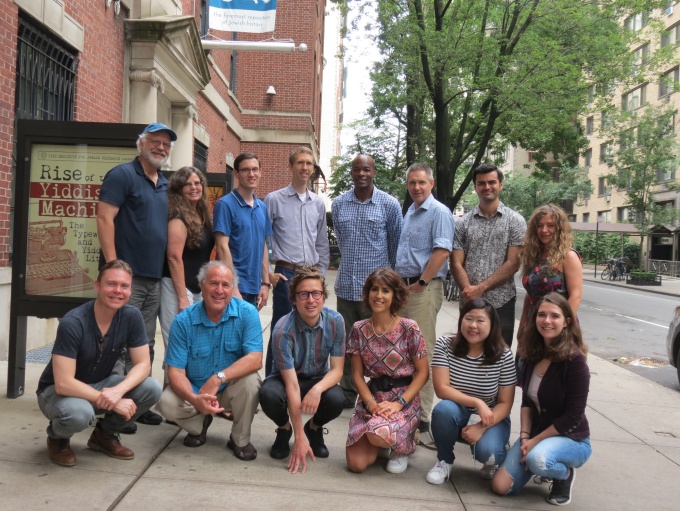7th Annual Levinas Philosophy Summer Seminar: "Irresponsibility and Politics" - July 15-19, 2019 - New York City

Location
2019: Irresponsibility and Politics

TOPIC DESCRIPTION:
The political has always had two contending valences: justice and power. Ethical politics demands that power conform to justice, while realpolitik empowers power for power's sake. Putting justice first requires tremendous responsibility, individuals and groups distancing themselves from base selfishness for the sake of the higher common good. Respecting the dignity of each person, modern political thought conceives ethical politics in the form of democracy, the regulation of power as an expression of the will of the people. Authoritarianism, in contrast, consolidates power in the will of the unquestioned Leader. From the viewpoint of the former, the latter represents political "irresponsibility." Interestingly, however, the leading theorist of authoritarian governance, the Nazi jurist Carl Schmitt, and one of the leading theorists of ethical politics, Emmanuel Levinas, both criticize irresponsibility by characterizing it in precisely the same manner, as an abstract detached freedom: "political romanticism" for Schmitt, and the "temptation of temptation" for Levinas. For both thinkers irresponsibility promotes a pure freedom, choice, over whatever is chosen. Schmitt's "solution" is the supremacy of the resolute will of the Leader and the obedience of the people; Levinas's "solution" is "difficult freedom," acknowledging the primacy of the other person, morality, and the protection of all others, justice, based in morality. Starting with Kierkegaard's notion of aesthetic freedom, and taking up their criticisms of irresponsible freedom, the 2019 LPSS will examine and criticize Schmitt's politics of power in view of Levinas's ethical politics of justice, which will be illuminated and elaborated.
PARTICIPANTS
- Melissa Bradley, PhD candidate
St. Augustine Center for Liberal Arts, Villanova Department of Philosophy, Villanova, PA, USA - Lorenza Bottacin Cantoni, PhD
Research Fellow, Department of Philosophy, Sociology, Educational Sciences and Applied Psychology, University of Padova, Italy - Ricky L. DeSantis
Miami University, Oxford, OH, USA - Daniel Dufournaud, PhD candidate
English Department, York University, Toronto, Ontario, Canada - Alex Forrester
Co-Founder & Chief Strategy & Innovation Officer Rising Tide Capital, Jersey City, NJ, USA - Haeyeun Han, MA
University of Chicago Divinity School, Chicago, IL, USA - Nigel Hatton, PhD
Assistant Professor, Literature, School of Social Sciences, Humanities and Arts, University of California, Merced, USA - Ján Hreško, PhD candidate
Department of Social Sciences and Philosophy, Faculty of Education at Charles University, Prague, Czech Republic - Sean Lawrence, PhD
Associate Professor of Critical Studies, University of British Columbia, Okanagan, Canada - Greg J. Wurm, PhD candidate
Department of Sociology, University of Notre Dame, Notre Dame, IN, USA
LOCATION:
Center for Jewish History, 15 W. 16th St., New York, New York 10011 USA
DIRECTOR:
Richard A. Cohen is a world-wide recognized Levinas scholar. He is author of four books on Levinas: Out of Control: Confrontation between Spinoza and Levinas (New York, 2017); Elevations: The Height of the Good in Rosenzweig and Levinas (Chicago, 1994); Ethics, Exegesis and Philosophy (Cambridge 2001); and Levinasian Meditations: Ethics, Philosophy, and Religion (Pittsburgh, 2010). He is also English translator and/or editor of four of Levinas’s books (Time and the Other and Additional Essays; Ethics and Infinity; Discovering Existence with Husserl; New Talmudic Readings); editor of Face to Face with Levinas (Pittsburgh, 1986); co-editor of Religions, Vol. 10, special issue on "Levinas and the Political" (Switzerland, 2019, and Levinas Studies, Vol. 11 (Pittsburgh, 2017) and In Proximity: Emmanuel Levinas and the Eighteenth Century (Lubbock, 2001); and author of many articles on Levinas and modern and contemporary philosophy. He is Professor of Jewish Thought and of Philosophy, University at Buffalo (State University of New York).
CO-DIRECTOR
James McLachlan is Professor of Philosophy and Religion at Western Carolina University. He has assisted at all five previous summer seminars. He is past co-chair of the Mormon Studies Group at the American Academy of Religion, member of the board of the Institute for American Religious and Philosophical Thought, and organizer of the Personalist Seminar. His books include Discourses in Mormon Theology: Philosophical and Theological Possibility (Salt Lake City, 2008) and The Desire to be God: Freedom and the Other in Sartre and Berdyaev (New York, 1992). McLachlan has additional publications on American and European Personalism, Process Theology, Romanticism and idealism, and Mormon Theology.
CO-ORGANIZER:
Jolanta Saldukaitytė is Associate Professor of Philosophy, Vilnius Gediminas Technical University, Vilnius, Lithuania. She has assisted at all six previous Levinas Philosophy Summer Seminar. She is co-editor of Religions, Vol. 10, special issue on "Levinas and the Political" (Switzerland, 2019), and Levinas Studies, Vol. 11 (Pittsburgh, 2017), and has published several articles on Levinas’s philosophy, especially in its relation to the thought of Martin Heidegger. Her research interests include phenomenology, ethics, theories of difference, and aesthetics.
CO-SPONSORS:
Department of Jewish Thought, 712 Clemens Hall, University at Buffalo, Buffalo, New York, 14260 USA; and American Jewish Historical Society, Center for Jewish History, 15 W. 16th St., New York, New York 10011 USA
CONTACT: levinas.center@gmail.com
